Across 35 countries, our survey finds widespread support for freedom of the press, freedom of speech and freedom on the internet. But the shares in each country who say these freedoms are very important range somewhat.
- A median of 61% say it’s very important that the media are able to report the news without censorship.
- A median of 59% say this about people being able to say what they want without censorship.
- A median of 55% say this about people being able to use the internet without censorship.
Freedom of the press
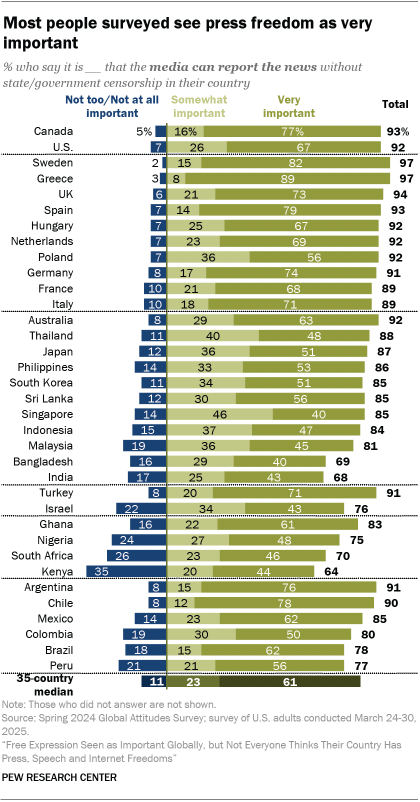
A median of 61% across the 35 countries surveyed say it is very important that the media are able to report the news without state or government censorship in their country. A median of 23% say this is somewhat important; 11% say it’s not too or not at all important.
Majorities of adults in Canada (77%) and the U.S. (67%) believe having freedom of the press is very important in their country.
In Europe, the shares saying freedom of the press is very important range from 56% in Poland to 89% in Greece. Majorities across all countries in the region hold this view.
In the Asia-Pacific region, varying shares say it’s very important that the media can report the news without censorship. About four-in-ten hold this view in Bangladesh, India and Singapore, compared with about six-in-ten in Australia. Shares in other Asia-Pacific countries fall in between.
Roughly seven-in-ten Turkish adults think press freedom is very important, a much higher share than the 43% of Israelis who say the same.
In the four sub-Saharan African countries surveyed, the share of adults who say press freedom is very important ranges from 44% in Kenya to 61% in Ghana.
And half or more of adults in each of the six Latin American countries polled say having a free press is very important.
Views by education
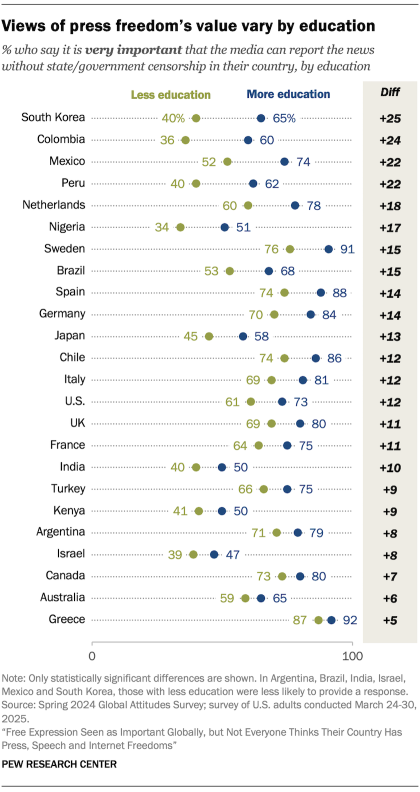
Education is linked to views of press freedom’s importance in many of the countries surveyed, including both middle- and high-income countries (as defined by the World Bank).
In South Korea, for example, adults with higher levels of education (in this case, a postsecondary education or more) are more likely than those who have less education to say having press freedom is very important. A similar pattern is present in countries spanning all regions included in the survey.
Views over time
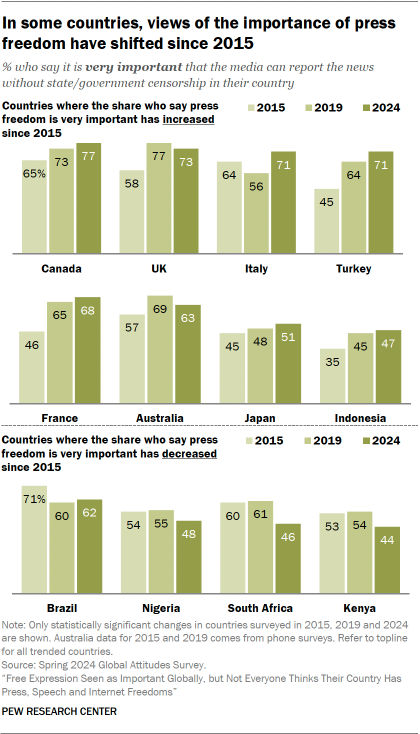
In eight countries, the share of adults who consider freedom of the press very important has increased since this question was first asked in 2015.
The change over time is particularly large in Turkey: 45% of Turks said a free press was very important in 2015, and 71% say this in the spring 2024 survey. Significant increases have also occurred in Canada, France, Indonesia, Italy, Japan and the UK.
But in a few countries, the share of those who see press freedom as very important has declined. In 2015, for example, 71% of Brazilian adults said freedom of the press was very important, compared with 62% most recently.
Since 2019, the share expressing this opinion has also dropped in South Africa (-15 points) and the Philippines (-11), as well as Kenya (-10), Poland (-8) and Nigeria (-7).
Americans’ views have fluctuated over time. The share saying a free press is very important was 67% in 2015, went up to 80% in 2019, then back down to 67% in 2025.
Similarly, the share of Australians saying press freedom is very important in 2024 is larger than it was in 2015, but smaller than it was in 2019.
Freedom of speech
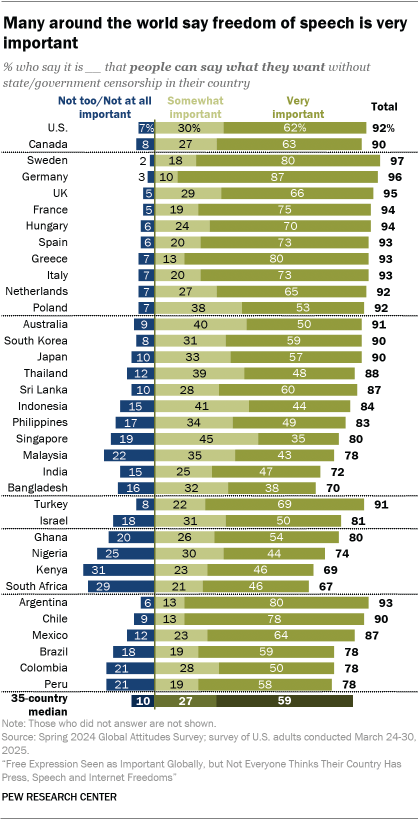
A median of 59% across 35 countries believe it is very important that people are able say what they want without state or government censorship. Another 27% say it is somewhat important, and 10% say it is not too or not at all important.
Majorities in Canada and the U.S. say having freedom of speech is very important in their country.
Views of free speech’s importance vary widely across the European countries polled: 53% of Polish adults say this freedom is very important to have in their country, while 87% in Germany say the same. And eight-in-ten in Greece and Sweden believe being able to speak without censorship is very important.
Just 35% of adults in Singapore say that having free speech is very important – the lowest share of all countries polled. Elsewhere in the Asia-Pacific region, half or more of Australians, South Koreans, Japanese and Sri Lankans believe it’s very important that people are able to speak without censorship.
In the Middle East-North Africa region, half of Israelis and 69% of Turks say freedom of speech is very important to have in their country.
While majorities across the four sub-Saharan African countries surveyed think free speech is at least somewhat important, only in Ghana does more than half of the public say free speech is very important (54%).
And at least half of adults in the six Latin American countries surveyed say speech without censorship is very important, including about eight-in-ten or more in Argentina and Chile.
Views by education
In 15 countries, adults with more education are more likely than those with less education to say having free speech in their country is very important.
In Peru, for example, 64% of those with an upper secondary education or more say it is very important to be able to speak without censorship, compared with 42% of those who have less education. Notably, in India, people with less education were also less likely to provide a response.
Views over time
In five countries, the share of adults who say it is very important to have free speech has increased since we first asked this question in 2015.
For example, 43% of Turkish adults in 2015 saw free speech as very important; in 2024, 69% say the same. Double-digit increases occurred in Indonesia and Italy as well.
In France, views have fluctuated over time: In 2024, three-quarters of French adults say free speech is very important, down from 83% in 2019, but up from 67% in 2015.
In other countries, the share who believe having free speech is important has decreased. In South Africa, for example, 46% say it is very important that people are able to say what they want without censorship in their country in 2024, down from 55% in 2019.
In the U.S., we asked about the importance of free speech again in 2025. The share of Americans who say it is very important that people in the U.S. can say what they want without government censorship increased from 56% in 2024 to 62% in 2025. However, this share remains lower than it was in 2015, when 71% of Americans said this.
Democrats are much more likely to say free speech is important in 2025 (63%) than they were in 2024 (49%). Republican sentiment has not moved as dramatically (67% said this in 2024 vs. 62% in 2025).
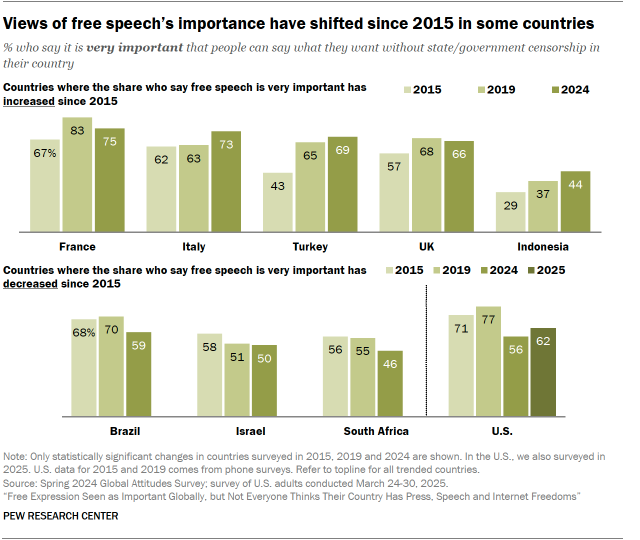
Freedom on the internet
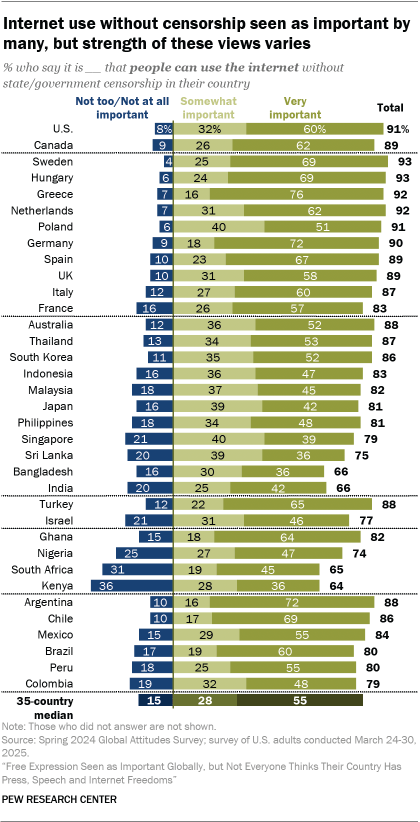
A median of 55% say it is very important that people are able to use the internet without state or government censorship in their country. Another 28% say this is somewhat important and 15% say it is not too or not at all important.
Roughly six-in-ten adults in Canada and the U.S. consider internet freedom very important. And half or more in each of the 10 European countries surveyed say the same.
Majorities across the Asia-Pacific region generally say freedom on the internet is important, and about half of adults or more in five countries (Australia, Indonesia, the Philippines, South Korea and Thailand) say this freedom is very important.
In sub-Saharan Africa, the share of those who say internet use free from censorship is very important across sub-Saharan Africa ranges from 36% in Kenya to 64% in Ghana. And about half of adults or more across the Latin American publics surveyed say this freedom is very important to have.
Views by social media use
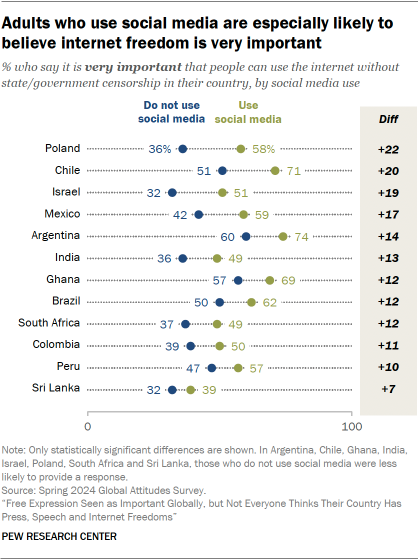
In over half of the 20 countries where we ask about social media use, adults who use social media are more likely than those who do not to say internet freedom is very important.
This is the case in every Latin American nation included in the survey.
Views by education
In many of the 35 countries surveyed, adults with more education are more likely than those with less education to say that it is very important that people are able to use the internet without censorship.
In South Korea, for example, those with a postsecondary education or more are 21 points likelier than those with less education to say internet freedom is very important to have in their country.
Views by concern about made-up news and information
Concern about false news is linked to views of internet freedom’s importance. In many countries included in the survey, people who say made-up news and information is a very big problem are more likely to see internet freedom as very important, compared with those who say made-up news is a moderately big problem, a small problem or not a problem at all.
Views over time
In many of the countries surveyed, the share of adults who say freedom on the internet is very important has decreased since 2019. This is the case in France (-13), Sweden (-11), Spain (-10), Argentina and Poland (-9), Hungary, Japan, the Netherlands and the UK (-8 each), Australia and Canada (-7 each), and South Africa (-5).
But in some other countries, the share of adults who say internet freedom on the is very important has increased since 2019. This is the case in India (+17 points), Indonesia, (+11), Turkey (+10), Italy (+8) and Israel (+6).
Views in the U.S. have fluctuated: The share of Americans who say internet freedom is very important decreased from 71% in 2019 to 54% in 2024. In 2025, 60% of Americans say it is very important to have freedom on the internet in their country.
Since 2019, several countries’ young adults have grown somewhat less inclined to say that internet freedom is very important. In Sweden for example, 86% of those ages 18 to 34 held this view in 2019, compared with 70% in 2024. Swedes in older age groups have also become less likely to say internet freedom is very important.
In the Netherlands, too, young people have become less likely to say internet freedom is very important (-13 points since 2019), while views among older age groups have not changed significantly in that time.




